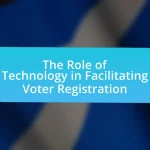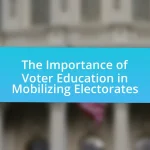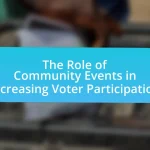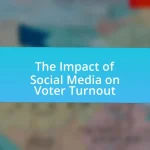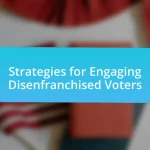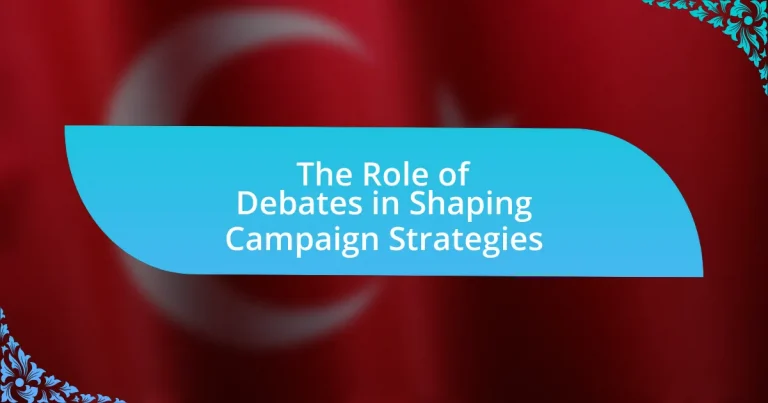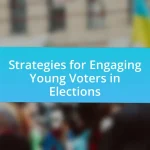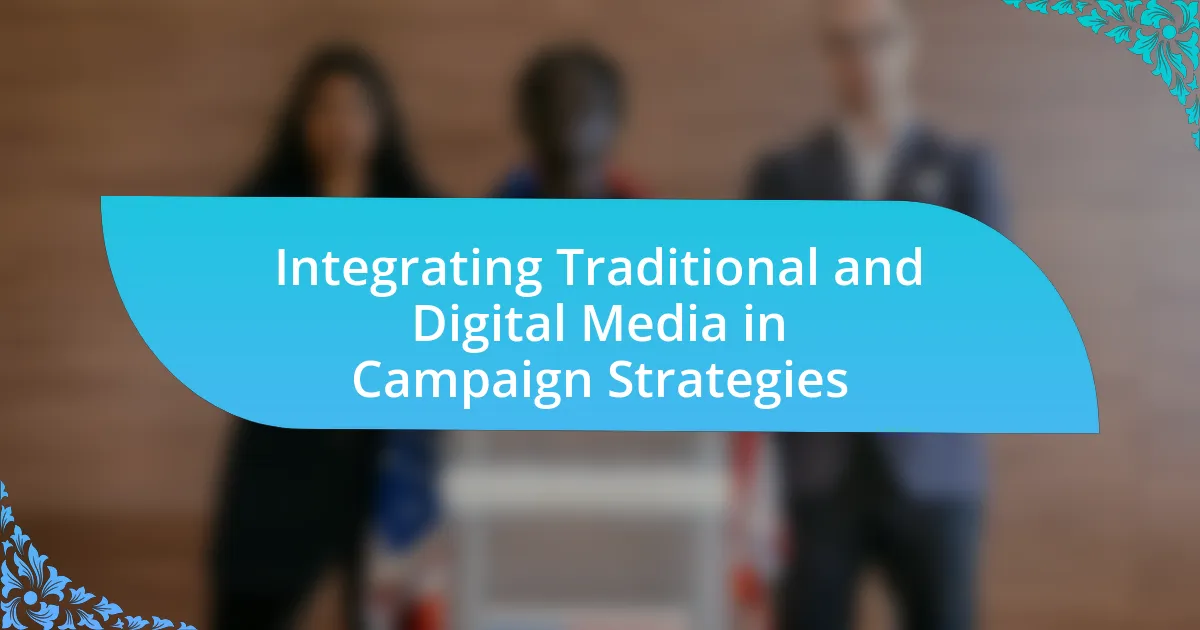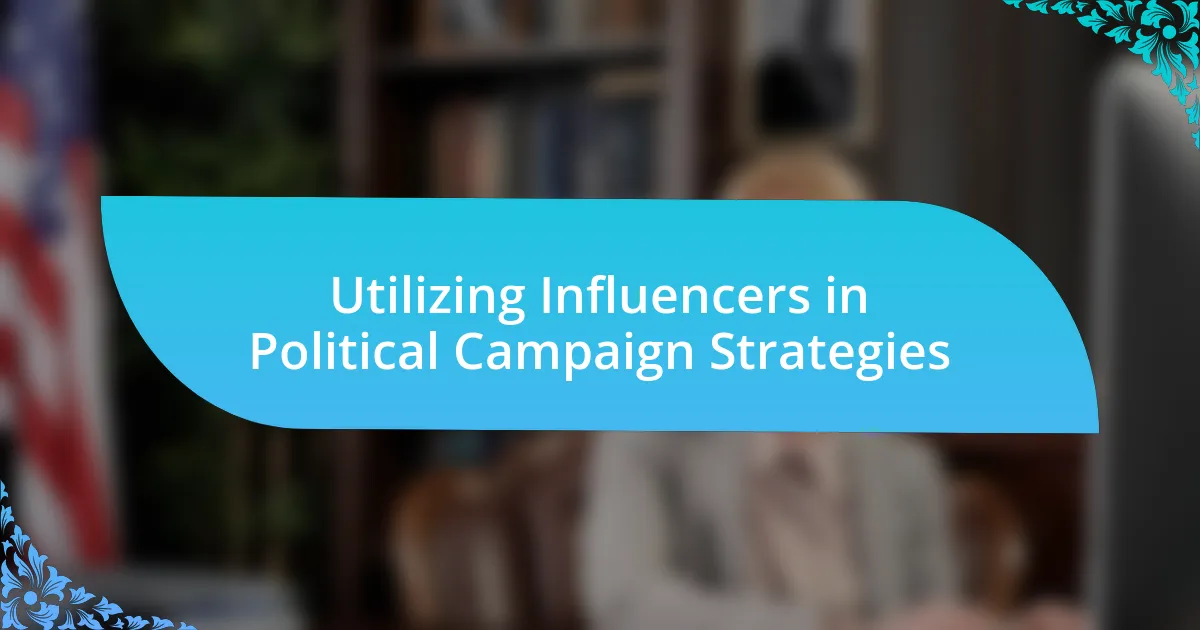The article examines the critical role of debates in shaping campaign strategies during elections. It highlights how debates provide candidates with a platform to articulate policies, engage with opponents, and connect with voters, significantly influencing public perception and voter behavior. Key aspects discussed include the impact of debate performances on polling, the influence of media coverage, and the various formats of debates that affect candidate effectiveness. Additionally, the article outlines best practices for candidates to maximize their debate impact, including preparation techniques and strategies for handling difficult questions, ultimately emphasizing the importance of debates in the electoral process.
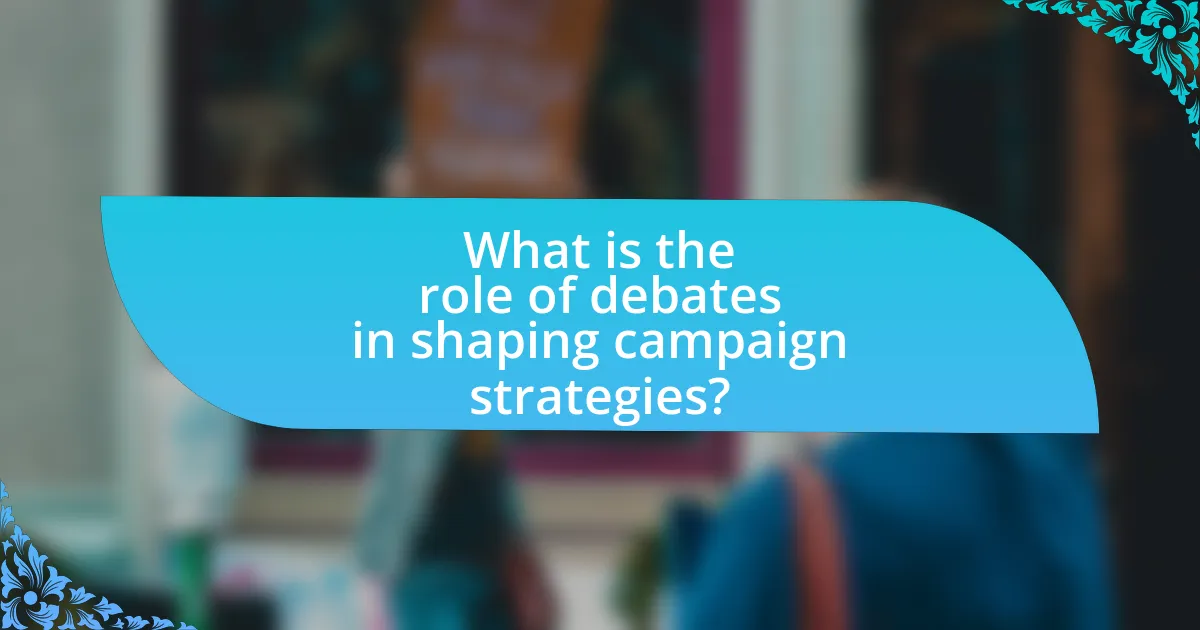
What is the role of debates in shaping campaign strategies?
Debates play a crucial role in shaping campaign strategies by providing candidates with a platform to articulate their policies, respond to opponents, and engage directly with voters. This interaction allows candidates to refine their messaging based on audience reactions and media coverage, which can significantly influence public perception and voter behavior. For instance, studies have shown that candidates who perform well in debates often see a boost in polls, as evidenced by the 2016 U.S. presidential election, where debate performances impacted voter preferences. Additionally, debates can highlight key issues, forcing candidates to address topics that may not have been central to their campaigns, thereby shaping their strategic focus leading up to the election.
How do debates influence public perception of candidates?
Debates significantly influence public perception of candidates by providing a platform for direct comparison of their policies, personalities, and communication skills. During debates, candidates articulate their positions on key issues, which allows voters to assess their competence and suitability for office. Research indicates that candidates who perform well in debates often experience a boost in polling numbers; for instance, a study by the Pew Research Center found that 63% of viewers reported being influenced by a candidate’s debate performance in the 2020 presidential election. This impact is further amplified by media coverage and social media discussions that follow debates, shaping narratives around candidates and reinforcing or altering public opinions.
What aspects of a candidate’s persona are highlighted during debates?
During debates, a candidate’s persona is highlighted through their communication style, demeanor, and ability to engage with opponents and the audience. Communication style includes clarity, persuasiveness, and the use of rhetoric, which can significantly influence public perception. Demeanor encompasses body language, confidence, and emotional intelligence, all of which contribute to how candidates are perceived in terms of leadership qualities. Additionally, the ability to effectively engage with opponents showcases a candidate’s critical thinking and adaptability, further shaping their image. These aspects are crucial as they directly impact voter impressions and can sway public opinion, ultimately affecting campaign strategies.
How do debates affect voter opinions and decisions?
Debates significantly influence voter opinions and decisions by providing a platform for candidates to present their policies and engage directly with opponents. Research indicates that debates can sway undecided voters, as they often highlight differences in candidate positions, which can lead to shifts in voter preferences. For instance, a study by the Pew Research Center found that 63% of debate watchers reported that the debates helped them make a decision about whom to support. Additionally, debates can enhance candidate visibility and credibility, impacting public perception and ultimately influencing electoral outcomes.
Why are debates considered a critical component of campaign strategies?
Debates are considered a critical component of campaign strategies because they provide candidates with a platform to communicate their policies, engage with opponents, and connect with voters in real-time. This direct interaction allows candidates to showcase their knowledge, charisma, and ability to think on their feet, which can significantly influence public perception and voter decision-making. Historical data shows that candidates who perform well in debates often experience a boost in polling numbers; for instance, after the 2016 presidential debates, Donald Trump saw a notable increase in support among undecided voters. Thus, debates serve as a pivotal moment in campaigns, shaping narratives and potentially altering the electoral landscape.
What historical examples illustrate the impact of debates on elections?
The 1960 Kennedy-Nixon debate exemplifies the significant impact of debates on elections, as it marked the first televised presidential debate in U.S. history. John F. Kennedy’s confident and charismatic performance contrasted sharply with Richard Nixon’s less polished appearance, leading to a shift in public perception that contributed to Kennedy’s narrow victory. Additionally, the 1984 Reagan-Mondale debate showcased Ronald Reagan’s effective use of humor and relatability, reinforcing his popularity and ultimately securing his re-election by a substantial margin. These examples illustrate how debates can influence voter opinions and election outcomes through the candidates’ presentation and public engagement.
How do debates serve as a platform for policy discussion?
Debates serve as a platform for policy discussion by facilitating direct dialogue between candidates, allowing them to present and defend their policy positions in front of an audience. This format encourages transparency and accountability, as candidates must articulate their views clearly and respond to opposing arguments. Historical examples, such as the 1960 Kennedy-Nixon debates, illustrate how televised debates can significantly influence public perception and voter decision-making by highlighting policy differences. Additionally, debates often address pressing issues, providing voters with a clearer understanding of candidates’ stances and proposed solutions, thereby enhancing informed electoral choices.
What are the different types of debates used in campaigns?
The different types of debates used in campaigns include formal debates, town hall debates, and online debates. Formal debates typically involve candidates presenting their positions on various issues in a structured format, often moderated by a third party, which allows for direct comparison of policies. Town hall debates are more interactive, allowing voters to ask questions directly to candidates, fostering a sense of community engagement. Online debates, increasingly popular with the rise of social media, enable candidates to reach a broader audience and engage in real-time discussions, often through platforms like Twitter or Facebook. Each type of debate serves to enhance candidate visibility and clarify their positions, ultimately influencing voter perceptions and decisions.
What formats do debates typically follow?
Debates typically follow formats such as Lincoln-Douglas, Policy, and Public Forum. The Lincoln-Douglas format focuses on values and ethics, featuring one-on-one debates where participants argue for or against a resolution. The Policy format involves teams debating a specific policy proposal, emphasizing evidence and practical implications. Public Forum debates are structured for two teams of two, discussing current events and aiming for a lay audience, with an emphasis on clarity and persuasion. These formats are standardized in competitive debate settings, ensuring consistency and fairness in the evaluation of arguments.
How do different debate formats affect candidate performance?
Different debate formats significantly affect candidate performance by influencing their communication style, audience engagement, and overall effectiveness in conveying their messages. For instance, in a traditional format with timed responses, candidates often perform better when they are concise and articulate, as seen in the 2016 U.S. presidential debates where Donald Trump and Hillary Clinton showcased distinct styles that resonated differently with voters. In contrast, formats that allow for open dialogue, such as town hall debates, enable candidates to connect more personally with the audience, which can enhance relatability and trust, as evidenced by Barack Obama’s success in town hall settings during the 2008 election cycle. Furthermore, research indicates that candidates who adapt their strategies to the specific format tend to outperform those who do not, highlighting the importance of flexibility in debate preparation and execution.
How do candidates prepare for debates to enhance their campaign strategies?
Candidates prepare for debates by conducting extensive research on key issues, practicing responses to potential questions, and engaging in mock debates to refine their delivery and messaging. This preparation allows candidates to articulate their positions clearly and counter opponents effectively, which is crucial for influencing public perception and voter decisions. For instance, a study by the Pew Research Center found that candidates who effectively communicate their policies during debates can significantly boost their favorability ratings among undecided voters.
What strategies do candidates use to anticipate opponents’ arguments?
Candidates use several strategies to anticipate opponents’ arguments, including thorough research, debate simulations, and understanding voter concerns. By analyzing past debates and public statements, candidates can identify common themes and potential counterarguments. Debate simulations allow candidates to practice responding to anticipated criticisms in real-time, enhancing their preparedness. Additionally, engaging with constituents helps candidates grasp the issues that matter most to voters, enabling them to predict the angles their opponents may take. These strategies are supported by the fact that successful debaters often rely on extensive preparation and adaptability to effectively counter their opponents’ points.
How important is practice and rehearsal in debate preparation?
Practice and rehearsal are crucial in debate preparation as they enhance a debater’s ability to articulate arguments clearly and respond effectively to opposing viewpoints. Engaging in practice allows debaters to refine their speaking skills, improve their timing, and develop strategies for countering arguments. Research indicates that participants who rehearse their speeches demonstrate significantly higher performance levels, with studies showing that effective practice can lead to a 20% increase in persuasive effectiveness. This underscores the importance of preparation in achieving success during debates, particularly in the context of shaping campaign strategies.
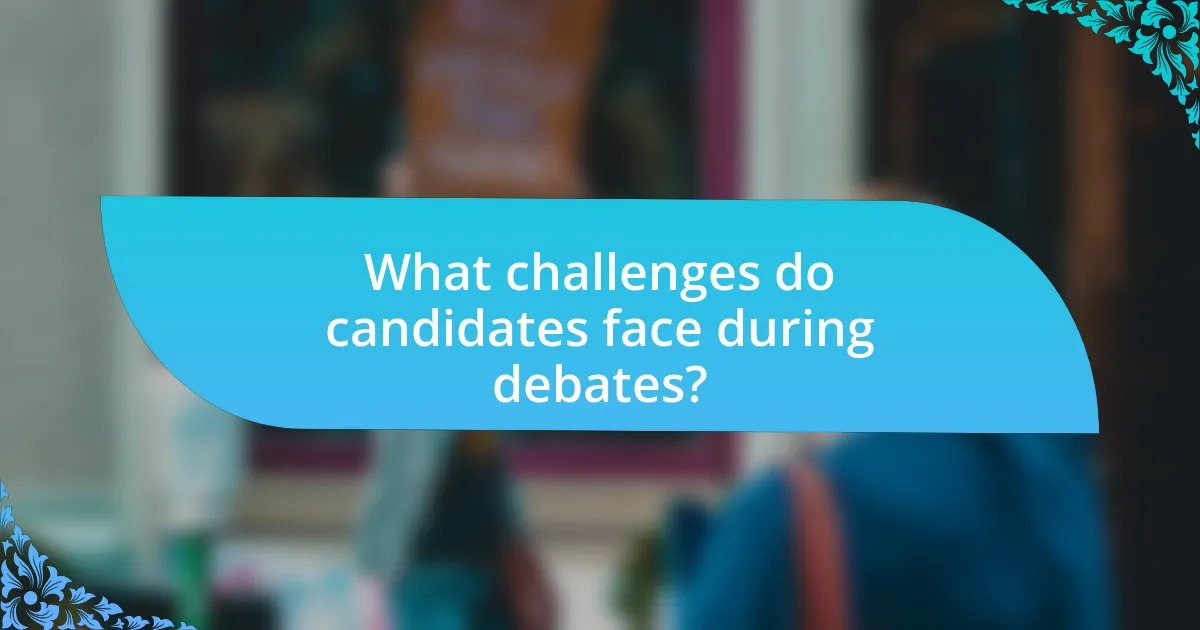
What challenges do candidates face during debates?
Candidates face several challenges during debates, including time constraints, pressure to respond quickly, and the need to articulate complex ideas clearly. Time constraints limit the ability to fully explain positions, often forcing candidates to oversimplify their arguments. The pressure to respond quickly can lead to mistakes or misstatements, which opponents may exploit. Additionally, candidates must navigate the challenge of addressing tough questions while maintaining composure and confidence, as public perception can be heavily influenced by their demeanor and responses. These factors collectively impact a candidate’s effectiveness in conveying their message and connecting with the audience.
How do unexpected questions impact debate performance?
Unexpected questions significantly impact debate performance by challenging a debater’s preparedness and adaptability. When faced with unanticipated inquiries, debaters may experience increased stress and difficulty in articulating coherent responses, which can detract from their overall effectiveness. Research indicates that the ability to think on one’s feet is crucial in debates; for instance, a study published in the Journal of Political Communication found that candidates who effectively handled unexpected questions were perceived as more competent and trustworthy by audiences. This highlights the importance of quick thinking and composure in maintaining a strong debate presence.
What techniques can candidates use to handle difficult questions?
Candidates can use techniques such as pausing, reframing, and providing structured responses to handle difficult questions effectively. Pausing allows candidates to gather their thoughts and formulate a coherent answer, which can prevent them from responding impulsively. Reframing involves interpreting the question in a way that aligns with their message or strengths, allowing them to pivot the conversation toward their key points. Providing structured responses, such as using the STAR method (Situation, Task, Action, Result), helps candidates present their answers clearly and logically. These techniques are supported by communication studies that emphasize the importance of strategic thinking and clarity in high-pressure situations, such as debates, where candidates must maintain composure and convey their messages effectively.
How do candidates manage their emotions during high-pressure moments?
Candidates manage their emotions during high-pressure moments by employing techniques such as deep breathing, visualization, and positive self-talk. These strategies help candidates maintain composure and focus, allowing them to respond effectively under stress. Research indicates that deep breathing can lower cortisol levels, which are associated with stress, while visualization techniques have been shown to enhance performance by mentally preparing candidates for challenging scenarios. Positive self-talk reinforces confidence and reduces anxiety, contributing to better emotional regulation during debates and other high-stakes situations.
What role does media play in shaping the narrative around debates?
Media plays a crucial role in shaping the narrative around debates by influencing public perception and framing the issues discussed. Through selective coverage, media outlets highlight specific moments, quotes, and themes, which can sway audience interpretation and opinion. For instance, a study by the Pew Research Center found that 62% of Americans believe that media coverage significantly affects their understanding of political debates. This demonstrates that the way media presents information can create biases, emphasizing certain candidates’ strengths or weaknesses, thereby impacting voter decisions and campaign strategies.
How do post-debate analyses influence public opinion?
Post-debate analyses significantly influence public opinion by framing the narrative surrounding candidates’ performances and shaping voter perceptions. These analyses often highlight key moments, strengths, and weaknesses, which can reinforce or alter existing opinions about candidates. For instance, a study by the Pew Research Center found that 63% of viewers reported changing their opinions about a candidate after watching a debate, largely due to the interpretations provided by analysts and media coverage. This indicates that the way debates are analyzed can lead to shifts in voter sentiment, ultimately impacting election outcomes.
What impact do social media platforms have on debate discussions?
Social media platforms significantly influence debate discussions by facilitating real-time engagement and amplifying diverse viewpoints. These platforms enable users to share opinions, comment on debates, and disseminate information rapidly, which can shape public perception and discourse. For instance, a study by the Pew Research Center found that 64% of Americans believe social media has a major impact on political discussions, highlighting its role in shaping narratives during debates. Additionally, social media can create echo chambers, where users are exposed primarily to viewpoints that reinforce their own beliefs, potentially polarizing discussions further.
How can candidates leverage debate performances for future campaign strategies?
Candidates can leverage debate performances for future campaign strategies by analyzing their own strengths and weaknesses as well as those of their opponents. This analysis allows candidates to refine their messaging, identify key issues that resonate with voters, and adjust their strategies to address any gaps in their performance. For instance, after the 2016 U.S. presidential debates, candidates used feedback from focus groups and polls to pivot their campaign messages, focusing on issues that gained traction during the debates. Additionally, candidates can utilize memorable moments from debates in their advertising and social media campaigns to reinforce their brand and connect with voters emotionally. This strategic use of debate content can enhance voter engagement and improve overall campaign effectiveness.
What lessons can be learned from debate successes and failures?
Debate successes and failures teach critical lessons about effective communication and strategic positioning in campaigns. Successful debates often highlight the importance of clear messaging, as candidates who articulate their positions effectively tend to resonate more with audiences, leading to increased support. For instance, Barack Obama’s performance in the 2008 presidential debates showcased his ability to connect with voters through relatable narratives and concise arguments, which significantly boosted his campaign momentum.
Conversely, failures in debates reveal the pitfalls of poor preparation and lack of authenticity. Candidates who appear unprepared or overly scripted can alienate voters, as seen in the 2016 presidential debates where Donald Trump’s off-the-cuff remarks sometimes overshadowed his policy points, leading to mixed reactions from the electorate. This illustrates that authenticity and preparedness are crucial for maintaining credibility.
Overall, the lessons learned from debate outcomes emphasize the necessity of strategic communication, preparation, and the ability to engage authentically with the audience to shape successful campaign strategies.
How can candidates use debate feedback to refine their messaging?
Candidates can use debate feedback to refine their messaging by analyzing audience reactions and critiques to identify strengths and weaknesses in their communication. This process involves reviewing feedback from debate moderators, audience members, and analysts to understand which points resonated and which did not. For instance, if a candidate receives consistent feedback that their stance on healthcare was unclear, they can adjust their messaging to provide clearer, more concise explanations. Additionally, candidates can leverage polling data post-debate to gauge public perception of their messages, allowing them to tailor their campaign strategies effectively. This iterative approach to refining messaging based on direct feedback enhances a candidate’s ability to connect with voters and address their concerns more effectively.
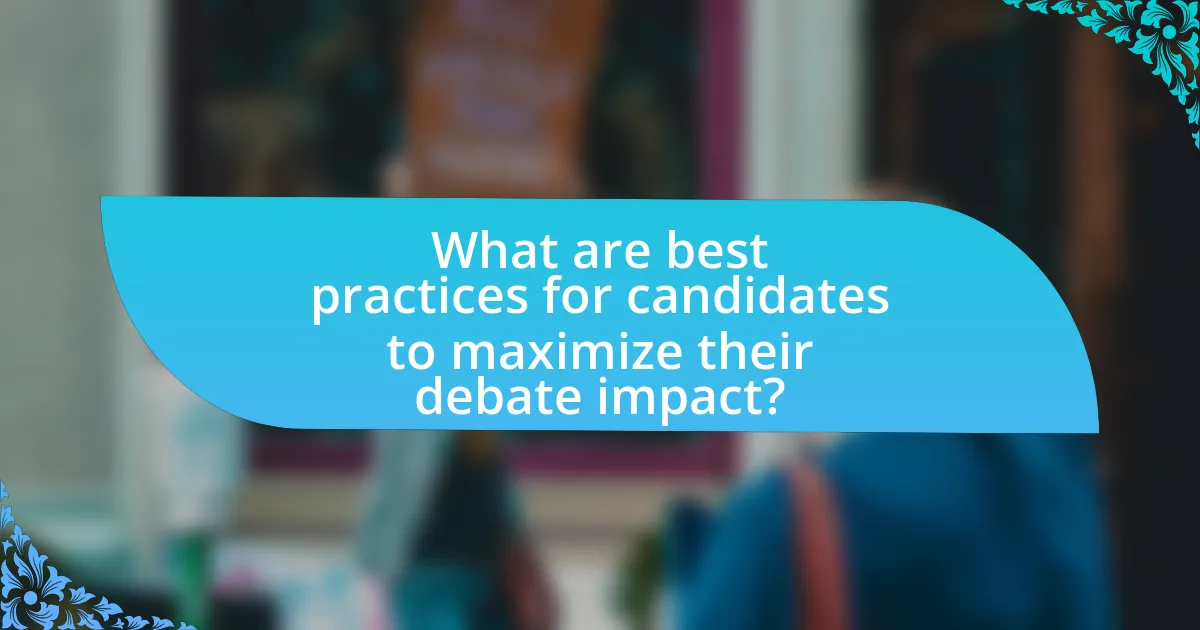
What are best practices for candidates to maximize their debate impact?
Candidates can maximize their debate impact by thoroughly preparing their key messages and understanding their opponents’ positions. Effective preparation involves researching relevant issues, practicing responses to potential questions, and developing clear, concise talking points that resonate with the audience. Additionally, candidates should engage in mock debates to simulate the actual environment, allowing them to refine their delivery and body language.
Understanding opponents’ positions enables candidates to anticipate counterarguments and respond effectively, demonstrating their knowledge and confidence. Studies show that candidates who articulate their policies clearly and engage with their opponents’ arguments tend to leave a stronger impression on voters. For instance, a 2016 analysis by the Pew Research Center indicated that candidates who effectively countered their opponents’ claims were perceived as more credible and trustworthy.
How can candidates effectively communicate their key messages during debates?
Candidates can effectively communicate their key messages during debates by utilizing clear and concise language, focusing on key points, and engaging with the audience. Clear language ensures that messages are easily understood, while focusing on key points helps candidates avoid overwhelming the audience with information. Engaging with the audience, through eye contact and addressing their concerns, fosters a connection that enhances message retention. Research shows that candidates who employ these strategies are more likely to resonate with voters, as evidenced by studies indicating that effective communication can significantly influence public perception and voting behavior.
What techniques can enhance clarity and persuasion in debate responses?
Techniques that enhance clarity and persuasion in debate responses include structured argumentation, the use of rhetorical devices, and active listening. Structured argumentation involves presenting ideas in a clear, logical sequence, which helps the audience follow the speaker’s reasoning. Rhetorical devices, such as metaphors and analogies, can make complex ideas more relatable and memorable, thereby increasing persuasive impact. Active listening allows debaters to address opponents’ points directly, demonstrating engagement and understanding, which can strengthen their own arguments. Research indicates that effective communication strategies significantly improve audience retention and persuasion, as evidenced by studies in communication theory that highlight the importance of clarity and emotional appeal in persuasive discourse.
How important is body language and non-verbal communication in debates?
Body language and non-verbal communication are crucial in debates, significantly influencing audience perception and candidate effectiveness. Research indicates that non-verbal cues, such as facial expressions and gestures, can convey confidence and sincerity, impacting how messages are received. For instance, a study published in the Journal of Nonverbal Behavior found that candidates who exhibited positive body language were perceived as more competent and trustworthy, which can sway voter opinions and ultimately affect election outcomes.
What common pitfalls should candidates avoid in debates?
Candidates should avoid common pitfalls such as failing to prepare adequately, engaging in personal attacks, and losing focus on key issues. Adequate preparation is crucial, as candidates who do not research their opponents or the debate topics often struggle to respond effectively, leading to a lack of credibility. Engaging in personal attacks detracts from the substantive discussion and can alienate voters, as evidenced by studies showing that negative campaigning can backfire. Lastly, candidates must maintain focus on key issues; drifting into irrelevant topics can confuse the audience and weaken their message, as seen in debates where candidates who stray from core issues often receive lower approval ratings.
How can candidates prevent themselves from appearing defensive or aggressive?
Candidates can prevent themselves from appearing defensive or aggressive by maintaining a calm demeanor and using positive language during debates. This approach fosters a constructive dialogue, allowing candidates to address criticisms without escalating tensions. Research indicates that candidates who practice active listening and acknowledge opposing viewpoints are perceived as more approachable and less combative. For instance, a study by the Pew Research Center found that candidates who engage in respectful discourse are more likely to resonate positively with voters, enhancing their overall campaign strategy.
What strategies can help candidates stay on message during debates?
Candidates can stay on message during debates by employing clear messaging frameworks, practicing effective communication techniques, and utilizing strategic repetition. Clear messaging frameworks involve defining key themes and core messages that resonate with the audience, ensuring that all responses align with these themes. Effective communication techniques, such as active listening and concise responses, help candidates address questions while steering the conversation back to their main points. Strategic repetition reinforces key messages, making them memorable for the audience. Research indicates that candidates who consistently align their responses with their core messages are more likely to maintain audience engagement and support, as seen in the 2016 U.S. presidential debates where candidates who adhered to their messaging frameworks performed better in polls.
What practical tips can candidates follow to prepare for successful debates?
Candidates can prepare for successful debates by thoroughly researching their topics and opponents. This preparation involves understanding key issues, current events, and the positions of their opponents, which allows candidates to formulate strong arguments and counterarguments. Additionally, practicing responses to potential questions and engaging in mock debates can enhance their speaking skills and confidence. Studies show that candidates who engage in extensive preparation and practice are more likely to perform well in debates, as they can articulate their points clearly and respond effectively under pressure.
How can mock debates improve candidate readiness?
Mock debates enhance candidate readiness by providing a simulated environment for practicing responses to challenging questions and scenarios. This practice allows candidates to refine their messaging, improve their public speaking skills, and develop strategies for countering opponents’ arguments. Research indicates that candidates who engage in mock debates demonstrate increased confidence and better performance in actual debates, as they become familiar with the format and pressure of real-time questioning. For instance, a study by the American Political Science Association found that candidates who participated in mock debates were 30% more likely to perform effectively in actual debates compared to those who did not.
What resources are available for candidates to enhance their debate skills?
Candidates can enhance their debate skills through various resources such as debate training workshops, online courses, and practice platforms. Debate training workshops, often conducted by experienced debaters or coaches, provide hands-on experience and personalized feedback. Online courses, available on platforms like Coursera or Udemy, offer structured learning on argumentation, public speaking, and critical thinking. Additionally, practice platforms like Debate.org allow candidates to engage in real-time debates, helping them refine their skills in a competitive environment. These resources collectively contribute to a candidate’s ability to articulate their positions effectively and respond to opposing viewpoints.



